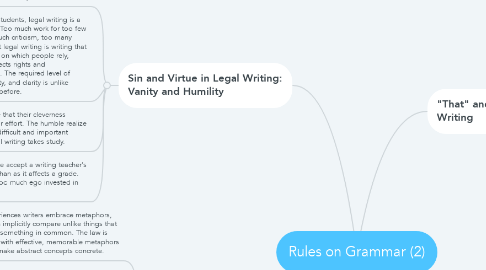
1. Sin and Virtue in Legal Writing: Vanity and Humility
1.1. The best legal writers are humble about their writing and their writing skills. Te best legal writing has humility.
1.2. For many law students, legal writing is a hated subject. Too much work for too few credits. Too much criticism, too many corrections. Yet legal writing is writing that counts, writing on which people rely, writing that affects rights and responsibilities. The required level of accuracy, brevity, and clarity is unlike anything seen before.
1.3. The vain believe that their cleverness compensates for effort. The humble realize that learning a difficult and important subject like legal writing takes study.
1.4. Only the humble accept a writing teacher's criticism other than as it affects a grade. The vain have too much ego invested in their writing.
2. Not Mere Rhetoric: Metaphors and Similes
2.1. Experiences writers embrace metaphors, which implicitly compare unlike things that have something in common. The law is filled with effective, memorable metaphors that make abstract concepts concrete.
2.2. Jurisprudence with metaphors and similes
2.2.1. "Good faith, we ruled in Dario vs. Mison, is a basic ingredient for the validity of any government reorganization. It is the golden thread that holds together the fabric of the reorganization. Without it, the cloth would disintegrate." The phrase is, the golden thread that hold together the fabric of the organization. It implies that good faith is like a thread that keeps the organization from falling apart. (BLAQUERA VS. THE CIVIL SERVICE COMMISSION, Sept. 10 1993)
2.2.2. "Against this backdrop, the stage was indeed set for the remedy prayed for." This would imply that with the facts given and stated, the remedy for the issue can now be prepared. (CALTEX VS. PALOMAR, Sept. 29, 1969)
3. "That" and "Which" in Legal Writing
3.1. Use "that" as a structural device to aid understanding; otherwise delete. (Ex: "The lawyer said on Monday he will write the brief." Is it "The lawyer said that on Monday he will write the brief." or "The lawyer said on Monday that he will write the brief?")
3.2. That vs. Which: Learn the difference between "that," a demonstrative pronoun (that law review article), and "which", an interrogative pronoun )which law review article). THAT is restrictive (or defining). WHICH is not restrictive (or non-defining).
4. Tense in Legal Writing
4.1. Using Has and Had
4.1.1. The retrospective present (present perfect) refers to a past action that extends to the present (Examples: "He had died" becomes "He died." ; "I have got no memory for case law" becomes "I have no memory for case law.")
4.2. Using Was and Were
4.2.1. The subjective "were" introduces a falsity. (Ex.: "If the law clerk were a good writer he would leave his ego at the door and let me edit his work.")
4.3. Shall and Will
4.3.1. In the first person, "Shall" is used to express a prediction or intention. In all other persons, "will" is used to express a prediction or intention.
4.4. Time frames
4.4.1. Examples: "Am (is, are) going to" becomes "will". "As of this date" becomes "today".
4.4.2. Currently, presently. Currently means now. presently means soon. It is redundant to use the present tense is, am, are with currently.
